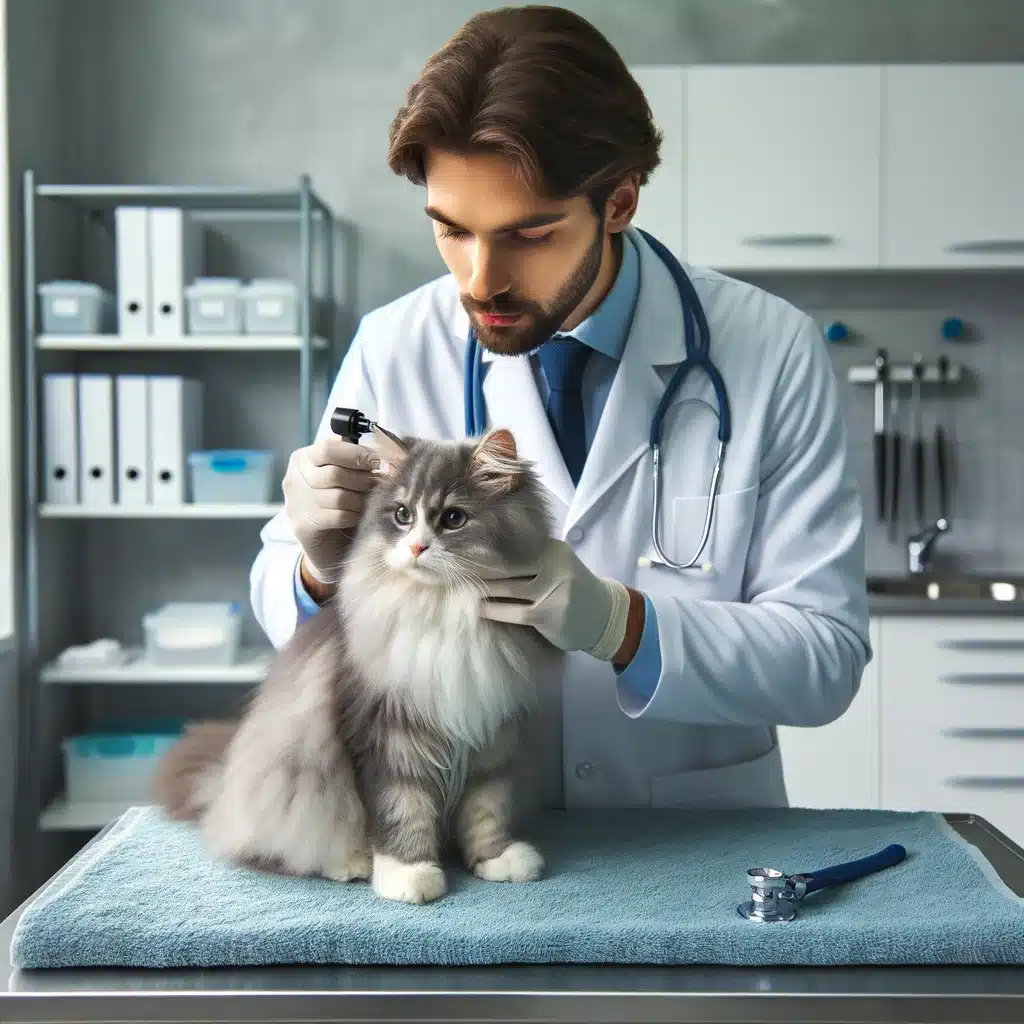
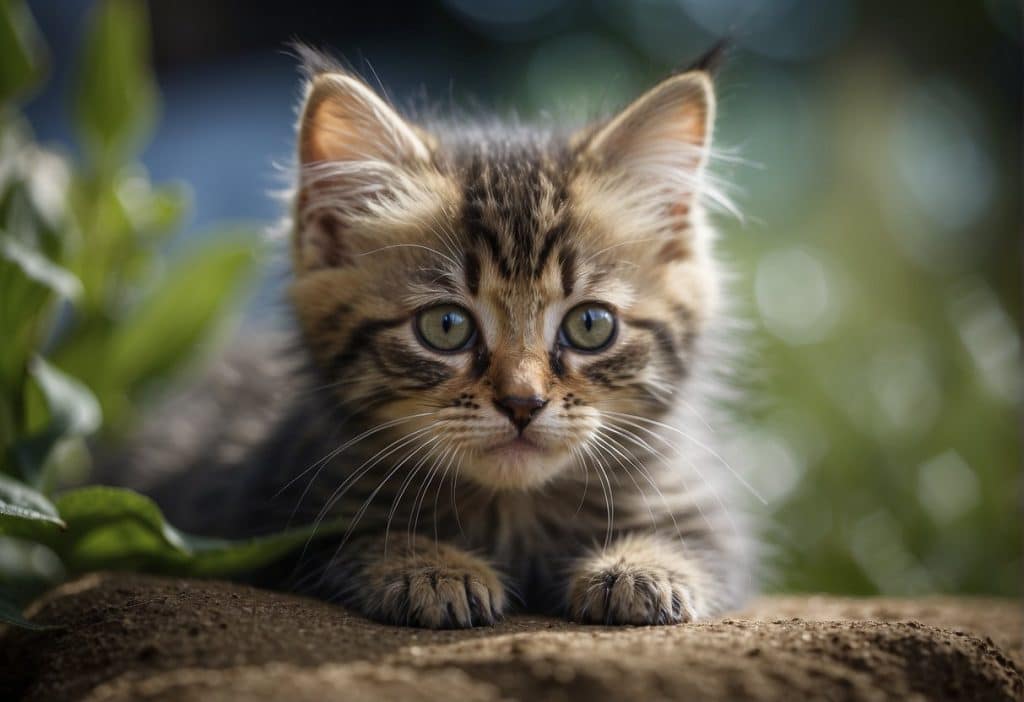
When you discover that a kitten is showing signs of distress, it’s crucial to determine if it’s Fading Kitten Syndrome – a situation that needs immediate attention.
Defining Fading Kitten Syndrome
Fading Kitten Syndrome (FKS) refers to a variety of symptoms rather than a single disease, affecting neonatal kittens’ ability to thrive. You might observe this in kittens from birth up to weaning age. It is a critical state where prompt identification and action can mean the difference between life and death for these little ones.
Common Causes and Contributors
The causes of Fading Kitten Syndrome can range from low birth weight to congenital defects. Nutrition plays a pivotal role in the health of newborn kittens, and inadequate feeding can lead to dehydration and further weaken their immune system. Moreover, various infections—whether viral, bacterial, or parasitic—can compromise a kitten’s fragile health state. Understanding these causes can help you stay alert and provide timely intervention if necessary.
Symptoms and Diagnosis
When caring for kittens, it is crucial that you can identify and understand the symptoms of Fading Kitten Syndrome (FKS) and know when to seek diagnostic assistance from a vet. Early intervention can mean the difference between life and death for a kitten displaying signs of FKS.
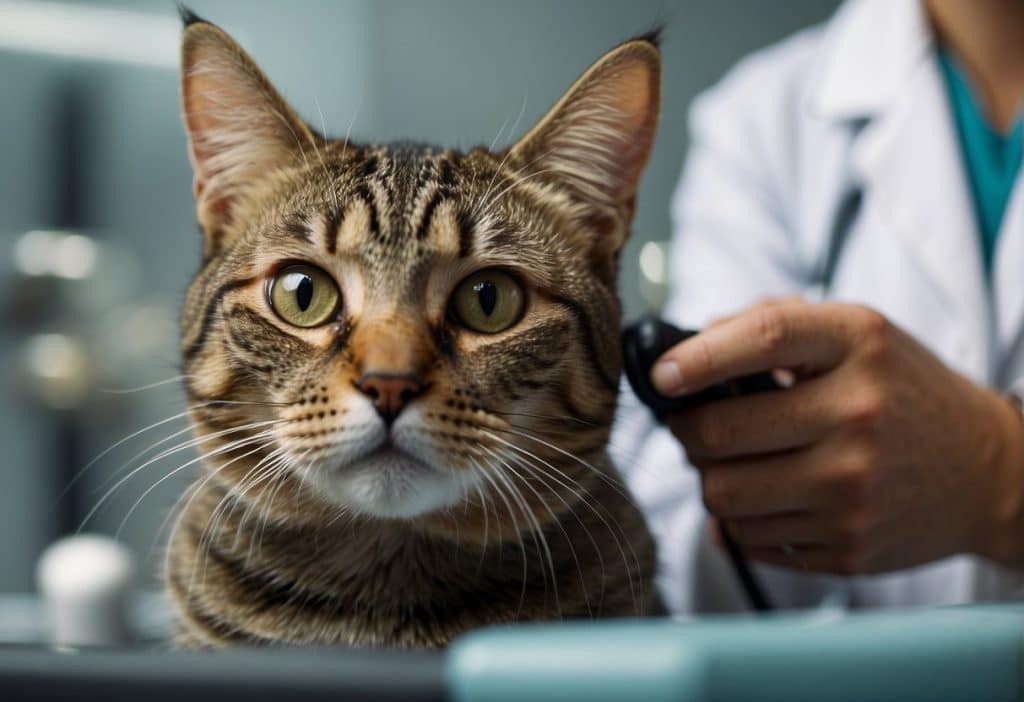
Recognizing the Signs
Fading Kitten Syndrome can present several distinct signs that you need to watch for closely:
- Lethargy: A kitten that is excessively tired, showing little interest in its surroundings, or unwilling to engage in normal activities may be lethargic.
- Hypothermia: Feel for a kitten’s body temperature; any chill or persistent coolness might indicate hypothermia, especially in their extremities.
- White Gums: Checking the color of a kitten’s gums can be telling—pale or white gums suggest poor circulation or anemia.
- Low Birth Weight: Kittens that are significantly smaller than their littermates and not gaining weight could be at risk.
- Gastrointestinal Issues: Keep an eye out for symptoms like diarrhea or vomiting, which can both lead to and be signs of FKS.
- Respiratory Difficulty: If a kitten has trouble breathing, this could signify a severe complication associated with FKS.
- Dehydration: Pinch the skin lightly; if it doesn’t snap back quickly, the kitten might be dehydrated, a common issue in FKS cases.
Diagnostic Procedures
Diagnosing FKS often starts with a thorough physical examination to identify the aforementioned symptoms. In addition, specific tests can aid in a comprehensive diagnosis:
- Bloodwork: A complete blood count can highlight infections or anemia.
- Urinalysis: This test checks a kitten’s urine for signs of dehydration or kidney problems.
- Fecal Sample Examination: Analyzing a fecal sample helps rule out parasites or infections that could cause gastrointestinal symptoms.
Keep in mind that these diagnostic procedures are necessary to ascertain the presence of FKS and should be conducted by a trained veterinarian. If you notice any of the signs above, it’s essential to act quickly and consult your vet for an accurate diagnosis and timely treatment.
Treatment Strategies
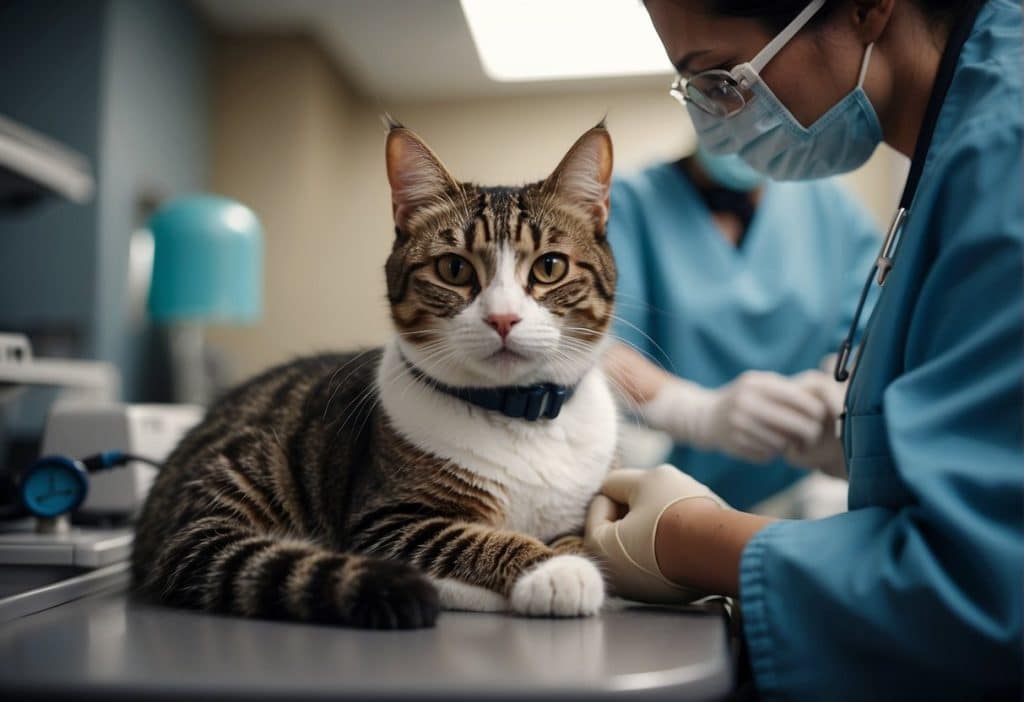
When caring for a kitten with Fading Kitten Syndrome (FKS), your quick action can be life-saving. Prioritizing immediate care to stabilize the kitten is crucial, followed by long-term health management to ensure continued recovery and growth.
Immediate Care Procedures
Your first step is to assess the kitten’s body temperature and provide warmth, as kittens with FKS often struggle to regulate their body temperature. Use a heating pad set on low or a warm, not hot, water bottle wrapped in a towel to gently warm the kitten. Avoid direct heat which can harm the delicate skin.
Hydration is another critical factor. Depending on the severity, you may need to administer subcutaneous fluids as prescribed by your veterinarian. Mild cases might only require careful oral rehydration with a syringe, but always avoid cow’s milk, as it’s not suitable for kittens.
Long-Term Health Management
For continued care, it’s essential to ensure the kitten receives proper nutrition. This could mean tube feeding for very weak kittens, or bottle feeding with a vet-recommended formula. Keep a feeding schedule and monitor weight gain closely with a small scale.
If the veterinarian prescribes antibiotics or other medication, administer according to their instructions. Never give medications intended for humans or other animals without professional guidance.
Finally, regular check-ups with your veterinarian are key for managing any ongoing issues and adapting the treatment plan as your kitten grows. Remember, veterinary help is crucial for diagnosing and treating FKS effectively.
Prevention and Care
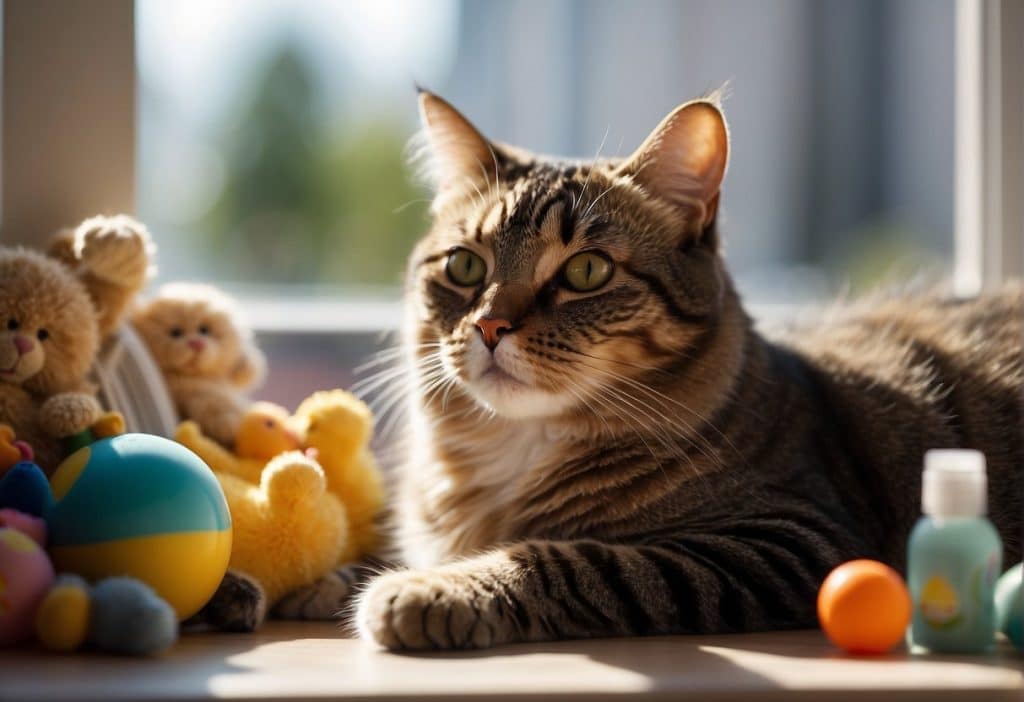
To give your kittens the best start in life, focusing on providing both the mother cat and the kittens with the right nutrition and environment is crucial. Let’s look at how you can do that.
Nutritional Support for Mother and Kittens
Your mother cat needs optimal nutrition, especially during pregnancy and lactation, to pass on vital colostrum—the first milk rich in antibodies—to her newborn kittens. Ensure she has a high-quality, nutrient-dense diet to help her produce this important milk. For the kittens, proper nutrition in their early stages supports healthy development. Remember to keep a close eye on them to ensure they are feeding well and gaining weight.
- Ensure the feeding formula (if supplementing) or cat food is high in calories and protein.
- Monitor the kittens’ growth by weighing them regularly.
Environmental Considerations
Creating a stress-free environment is essential for both the mother cat and her kittens. Their surroundings should be:
- Warm: Kittens cannot regulate their body temperature well. Keep the room at a comfortable 85-90 degrees Fahrenheit for the first few weeks.
- Quiet: A low-stress environment helps in preventing illness and supports better growth.
- Clean: Maintaining cleanliness reduces the risk of infections that can contribute to Fading Kitten Syndrome.
| Environmental Factor | Your Action |
|---|---|
| Temperature | Use heat lamps or heating pads to maintain a warm nesting area. |
| Noise | Minimize loud sounds and disturbances near the kittens’ area. |
| Cleanliness | Regularly sanitize feeding utensils and change bedding to prevent contamination. |
By balancing these factors, you’re setting a foundation for good health and reducing risks associated with Fading Kitten Syndrome.
When to Seek Veterinary Help

If your kitten exhibits any signs of illness, it’s crucial to get professional help promptly as early intervention can be lifesaving, particularly for conditions like fading kitten syndrome where dehydration, anemia, flea infestation, or infections could be underlying causes.
Recognizing Emergencies
Understanding when to rush your kitten to a veterinarian is essential. If you notice any of the following symptoms, it’s time to act fast:
- Lethargy: If your kitten is less responsive or active.
- Poor Appetite: A sudden lack of interest in feeding.
- Difficulty Breathing: Any signs of respiratory distress.
- Cool to the Touch: Indicative of hypothermia, which is common in emergencies.
- Unusual Cry or Silence: Can indicate pain or severe discomfort.
Immediately seek veterinary care if you observe any of these symptoms. Vets often use diagnostic tools to check for viral infections and bacterial infections which can be life-threatening without prompt treatment.
Treatment Follow-Up and Monitoring
After initial treatment, continue monitoring your kitten closely. Here’s how to ensure effective recovery:
- Maintain Temperature: Keep them warm to prevent hypothermia.
- Encourage Hydration: Ensure they have access to water to prevent dehydration.
- Monitor Weight and Appetite: Regular checks will help assess health progress.
- Check for Parasites: Fleas can cause flea anemia; treat as recommended by your vet.
- Administer Medication: If prescribed, follow your veterinarian’s exact dosage instructions.
Follow-up visits are important to track recovery. Never hesitate to contact your vet if you’re concerned about your kitten’s health. Remember, supportive care at home plays a vital role in their recovery, but always under veterinary guidance.
Frequently Asked Questions
In this section, you’ll find the most common concerns regarding Fading Kitten Syndrome (FKS), along with brief, factual answers to help you understand and address this condition in young cats.
What are the first signs of fading kitten syndrome?
The first signs of fading kitten syndrome are often subtle but can include constant whining or crying, lethargy, and a lack of appetite or poor nursing. You might also notice poor suckling reflexes and insufficient weight gain in the affected kitten.
How can fading kitten syndrome be treated?
Immediate veterinary intervention is crucial to treat fading kitten syndrome. Treatments may involve providing warm and sanitary living conditions, treating any underlying infections, and attentive supportive care, including bottle-feeding and hydration.
What causes fading kitten syndrome in cats?
Several factors can lead to fading kitten syndrome, including congenital defects, environmental stressors, infectious diseases, and inadequate maternal care. Determining the precise cause of FKS can be challenging, but it’s vital for providing the correct treatment.
Is there a survival rate associated with fading kitten syndrome?
The survival rate for kittens with FKS varies widely based on the promptness and effectiveness of the treatment. Early identification and intervention are crucial; without quick action, the prognosis may be poor.
Can cats fully recover from fading kitten syndrome?
Some kittens can make a full recovery from FKS, particularly if the condition is identified and addressed early. A complete recovery depends on the kitten’s overall health, access to adequate treatment, and the absence of severe developmental defects.
How might one manage fading kitten syndrome at home?
Managing FKS at home involves providing a warm environment, proper nutrition, and close monitoring of the kitten’s health. However, always seek veterinary care as FKS can deteriorate quickly and may require professional medical treatment to improve the kitten’s chance of survival.










Leave a Reply
You must be logged in to post a comment.